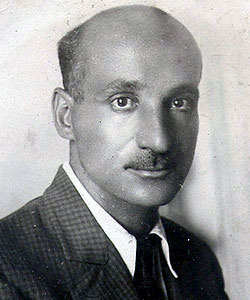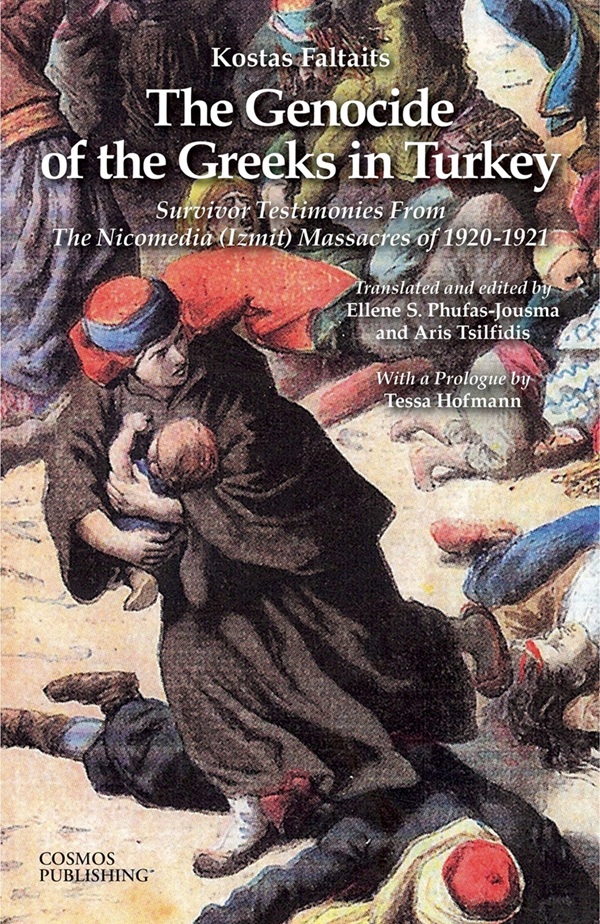THE GENOCIDE OF THE GREEKS IN TURKEY
SURVIVOR TESTIMONIES FROM THE NICOMEDIA (IZMIT) MASSACRES OF 1920-1921
By Kostas Faltaits
Edited and translated by Ellene Phufas-Jousma and Aris Tsilfidis
With a prologue by Tessa Hofmann
Cosmos Publishing 2016
Availability:
USA/Canada residents: Amazon
Australian residents: eBayEuropean residents: Faltaits Museum
To request a review copy, contact us
The Izmit Massacres were a series of massacres perpetrated by Kemalist forces on Greek communities in the region east of Istanbul historically known as Bithynia between 1920-1921. According to one report, at least 32 Greek villages were looted or burned and more than 12,000 Greeks were massacred.
In March of 1921, journalist Kostas Faltaits arrived in Asia Minor (today’s Turkey) sent by newspaper Embros to cover Greece’s movements in the Greco-Turkish War. By the time he arrived in the region of Nicomedia (today’s İzmit) - a region inhabited by a large number of Greek, Armenian and Circassian communities - Kemalist forces had already set fire to many of the surrounding towns and villages, leaving behind a trail of death and destruction. Faltaits came face to face with the fleeing survivors of these massacres, and was able to collect these valuable and graphic eye-witness testimonies which were published in both Greek and French at the time. Their stories include the mass burning of civilians in their churches and homes, rape and sexual torture of women, and the burning of children alive. The book also includes the observations of the Armenian Metropolitan of Nicomedia, Stephan Hovakimian.
Translated for the very first time in English and with a prologue by Tessa Hofmann, this edition puts into perspective the claims of mutual atrocities which both Greeks and Turks were accused of in this region. The events described in the book will shed some light into just one of the many chapters of the Greek Genocide, a genocide which claimed the life of approximately one million Greeks living in the former Ottoman Empire.
Reviews
The current English translation of testimonies collected by Kostas Faltaits represents [...] an excellent initiative which deserves to be extended to the methodic examination of the three main phases of the extermination of the Greeks of Asia Minor. Prof. Raymond Kévorkian, historian.
It is a book that will benefit all those who are interested in the fate of the Christians during the collapse of the Ottoman Empire and can also be very helpful to younger generations who are studying those events in high school or in colleges and universities. - Alexander Kitroeff, Professor of History.
..this new publication in English stands as a small but important victory for those who study genocides in the sad and ever-present need to understand and try to prevent them. Faltaits’s witness reports of the Nicomedia (Izmit) massacres will now hold up much longer against what Lincoln called 'the silent artillery of time.' Michael Kalafatas.
The accounts by Greek survivors in The Genocide of the Greeks in Turkey, of massacres, torture, rape, theft, and the destruction of villages, and the brutalizers' sheer pleasure in inflicting such suffering on fellow humans, attests to the depths to which humans are capable of descending. Thea Halo, author of Not Even My Name.
This is an important document about the Greek Genocide and deserves to be placed alongside other works of the 1920's such as the Black Book of the Ecumenical Patriarchate, George Horton's the Blight of Asia, and Edward Hale Bierstadt's the Great Betrayal. Theodore Karakostas, activist, author, writer.
With moving testimonies contextualized with scholarly and journalistic commentary, this book improves immeasurably our understanding of the Anatolian Greek genocide by Kemalist militants. The book helps to correct the omission of the Greek experience from the Armenian genocide literature. Hannibal Travis, Professor of Law.
Kosta Faltaits’s book based on the evidence of the survivors’ accounts brilliantly exposes the policy of the Kemalists to exterminate the Greek population of Nicomedia. The author using remarkable first-person accounts presents the chilling history of how the Turks tried by all means to eliminate one more Christian community of their country. Anahit Khosroeva, Ph.D.
As any researcher will tell you, primary source material is an invaluable resource. A first-hand account of any event provides direct context, placing the reader right into the time and place of the event in a way that a secondary source, such as a history book or article, cannot. To have primary source material written by a journalist, a person who writes well and is trained to observe, is priceless. ‘The Genocide of the Greeks in Turkey’, is such a document. Hariklia Heristanidis, author.
Book Reviews
- Theodore Karakostas. Assyrian Information Management. Also published in The Armenian-Mirror Spectator, Nov 25, 2017. Read
- Prof. Raymond Kévorkian. Études arméniennes contemporaines, Volume 9, September 2017, pp. 247-250. Read
- Michael Kalafatas. American Hellenic Institute Policy Journal, Volume 9, Spring 2018. Read
- Alexander Kitroeff. The Armenian Weekly, June 19, 2019. Read
- Hariklia Heristanidis. Neos Kosmos, September 3, 2019. Read
- Greek City Times, May 2020. Read
- Dan Georgakas, The National Herald, August 21, 2020. Read
Oral Interviews
- The History Author Show, August 24, 2020. Listen
Book Contents
* Editor’s Note * Prologue * Introduction * Foreword * Fulazik * The Songs of Fulazik * The Last Survivor of Nicaea * Kara Tepe * Fountouklia * Konzes * Lefkes * The Teacher of Otakioy * Giaour Ali * The Armenians * The Exodus of Karasou * Epilogue * Biography: Konstantinos Faltaits (1891-1944) * Publications * Index
About the author
 Kostas Faltaits (1891-1944) was a renowned Greek journalist and author. He worked for a number of major Athenian newspapers. He was born in Smyrna (today Izmir) in 1891 but in the same year his family moved to the island of Skyros. He studied Law and Philology at the University of Athens but in 1910 began his career in journalism. More about the author.
Kostas Faltaits (1891-1944) was a renowned Greek journalist and author. He worked for a number of major Athenian newspapers. He was born in Smyrna (today Izmir) in 1891 but in the same year his family moved to the island of Skyros. He studied Law and Philology at the University of Athens but in 1910 began his career in journalism. More about the author.
The book was originally published in Greek in 1921 under the title These are the Turks: Survivor Testimonies from the Nicomedia Massacres (Αυτοί είναι οι Τούρκοι: Aφηγήματα των Σφαγών της Νικομήδειας). It was published in French in 1922 & 1923 under the title Voila les Turcs! : recits des massacres d'Ismidt.




